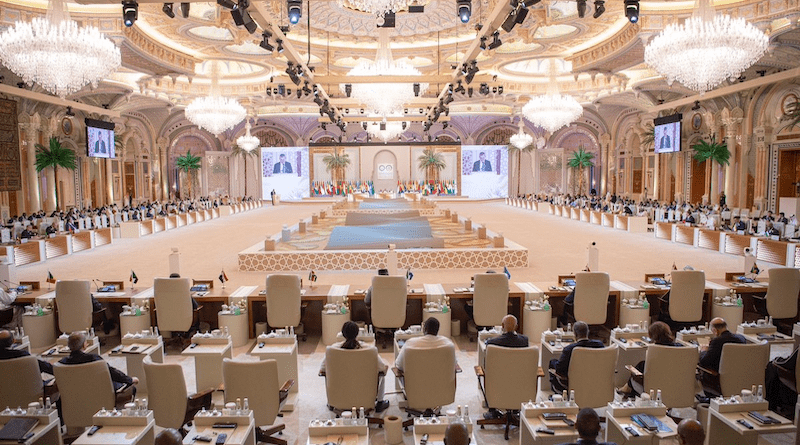Arab-Islamic Summit On Israeli-Palestinian Conflict: Missed Opportunities And Symbolic Gestures – OpEd
On November 11, 2023, the Arab-Islamic summit was held in Riyadh, Saudi Arabia, to discuss the Israeli aggression against the Palestinian people. The Arab-Islamic summit, hosted by Saudi Arabia, was convened to discuss the Israeli-Palestinian conflict. The summit was attended by heads of state such as prime ministers, presidents, emirs, and other equivalent heads from the 57 member states of the Organization of Islamic Cooperation.
Saudi Arabia’s Investment Minister, Khalid Al-Falih, announced that the objective of this summit was to drive towards a peaceful resolution of the conflict. Iranian President Ebrahim Raisi also attended the summit, marking the first visit by an Iranian head of state since Tehran and Riyadh ended years of hostility under a China-brokered deal. Raisi’s visit to Riyadh makes him the first Iranian president to visit the country since Mahmoud Ahmadinejad addressed an OIC meeting there in 2012.
During the conference, Egypt and Qatar’s efforts to broker peace between Israel and Hamas were applauded. The summit also urged the international community to intercede, emphasizing the need to protect civilians and deliver humanitarian relief. According to diplomats, Algeria and Lebanon have suggested that to respond to the destruction in Gaza, they should consider disrupting oil supplies to Israel and its allies. They also proposed severing economic and diplomatic ties that some Arab League nations have with Israel.
In a joint statement, they demanded an immediate ceasefire, the lifting of the Gaza siege and unrestricted access for humanitarian aid. They all opposed the forced displacement of Palestinians, either from Gaza to Egypt or from the West Bank to Jordan and called for an end to arms exports to Israel. They also urged a resumption of the peace process to facilitate the creation of a Palestinian state, alongside Israel.
The summit condemned Israel’s aggression and called for an immediate ceasefire and humanitarian access to the besieged enclave, where more than 11,000 Palestinians have been killed and 24,000 injured since October 7, 2023, according to the Palestinian Authority. The summit also expressed solidarity with the Palestinian people and their right to self-determination and statehood. The summit condemned Israel’s recent military actions in Gaza and Jerusalem and supported the Palestinian people’s right to self-determination and independence, with Jerusalem as their capital.
Some of the participants and observers criticized the summit for being too late and weak. The summit was held more than a month after the outbreak of the war, when most of the damage and casualties had already occurred. Besides, the summit didn’t announce any specific measures or sanctions against Israel, nor did it pledge any substantial financial or humanitarian aid to Gaza. The summit also didn’t address the root causes of the conflict, such as the Israeli occupation, settlement expansion, and blockade of Gaza.
The summit was marred by tensions between Saudi Arabia and Iran, the two opposing regional powers supporting different factions in the Middle East. Some Arab and Muslim countries, including the UAE, Bahrain, Morocco, and Sudan, have normalized, or improved their relations with Israel in recent years, causing criticism and pressure from their publics and other Muslim countries for their perceived betrayal of the Palestinian cause.
The effectiveness and impact of the Arab-Islamic summit is highly questionable. This was made evident by the timing of the summit, which was held five days after the UN Security Council vetoed a resolution calling for a ceasefire, due to the United States’ alliance with Israel. Unfortunately, the summit failed to put forward any tangible measures or initiatives to support the Palestinians or pressure Israel, such as sanctions, boycotts, or diplomatic actions. The summit was more of a symbolic gesture rather than a practical solution and it exposed the Arab and Muslim world’s weaknesses and divisions. They were unable to present a unified and coherent stance on the Palestinian issue.
With More than 11,000 Palestinians have been killed in Gaza since Oct. 7, according to Gaza’s Health Ministry. And the UN says 1.5 million Palestinians have been forced from their homes since 7th October. Due to which, criticisms arose regarding the timing of the summit, held after substantial damage and casualties had already occurred.
The Arab-Islamic summit failed to have a significant impact on the bigger picture, given that Gaza was under siege and being bombed at the time of the conference. Unfortunately, the summit missed a crucial opportunity to demonstrate the solidarity and influence of Arab and Muslim nations, and to challenge the status quo and the long-standing injustice against Palestinians. Consequently, the summit was a disappointment and a failure, as it did not provide any hope or relief to the people of Gaza, who are still undergoing the brutal occupation and the horrors of war. However, if we view it as an Islamic display of diplomacy and solidarity during these trying times, it was undoubtedly a triumph for regional stability.

